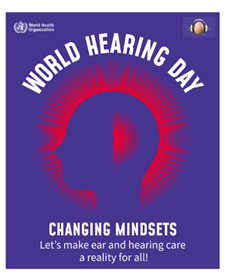Changing Mindsets on Hearing Disorders Associated with Work Hazards
Posted on by
The National Institute for Occupational Safety and Health’s (NIOSH) Hearing Loss Prevention Program has been an official member of the World Hearing Forum (WHF) since it was launched in 2019. The Forum was assembled by the Office of Ear and Hearing Care of the World Health Organization to promote ear and hearing care worldwide. NIOSH’s membership to the forum builds upon the Hearing Loss Prevention Program’s long-standing contributions to the prevention of work-related hearing loss. Since the early 1990’s NIOSH’s contributions to the World Health Organization’s Office of Ear and Hearing Care have focused on the promotion of healthy hearing while addressing hazardous noise and ototoxicant (chemicals causing hearing loss) exposures in the workplace. Noise and ototoxicants are both preventable risk factors which hold significant promise for alleviating the individual and societal burden of hearing loss (see World Report on Hearing, 2021).
Most of the WHF activities are aligned with NIOSH’s mission and activities. These include disseminating unique awareness and prevention information, assessing scenarios of risk, compiling audiometric and disease surveillance data, studying the effectiveness of current interventions, and promoting hearing health through accessible resources such as social media and Wikipedia. In particular, NIOSH contributes to two of the WHF workstreams. First, NIOSH researchers contribute to the Make Listening Safe workstream through publication of resources such as:
- the Workplace Solutions document Reducing the Risk of Hearing Disorders among Musicians,
- the Safe Listening at Venues and Events with Amplified Music MMWR article (together with authors from other CDC Centers) and
- the Safe Listening article posted on Wikipedia.

World Hearing Day logo from the World Health Organization
NIOSH researchers also participate on a second workstream dedicated to the annual World Hearing Day campaign which is celebrated on March 3rd every year. Since its inception in 2015, NIOSH has contributed to the campaign in various ways. These contributions can be seen in the annual reports. The theme of World Hearing Day 2024 is Changing Mindsets and will “focus on overcoming the challenges posed by societal misperceptions and stigmatizing mindsets through awareness-raising and information-sharing.”
This NIOSH Science Blog will be followed by a post dedicated to World Hearing Day 2024 in an effort to change mindsets by addressing myths on work-related hearing risks and their consequences emphasizing that:
- Hearing loss and other negative effects of noise CAN be prevented.
- Seeking treatment for hearing problems will contribute to your health and quality of life.
- Simple and low-cost changes at work can control noise and ototoxicant hazards.
Want to be part of World Hearing Day? Share these blogs and provide your thoughts below!
Thais C. Morata, PhD, is a Co-Manager of the NIOSH Hearing Loss Prevention Program and a Research Audiologist in the NIOSH Division of Field Studies and Engineering.
Christa L. Themann, MA, CCC-A, is a Research Audiologist in the NIOSH Division of Field Studies and Engineering.
Shelly Chadha, MD, is the Technical Lead, Office of Ear and Hearing Care, World Health Organization
Posted on by

